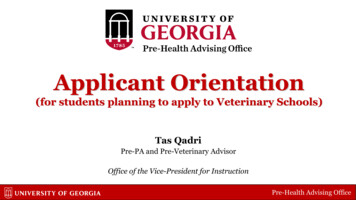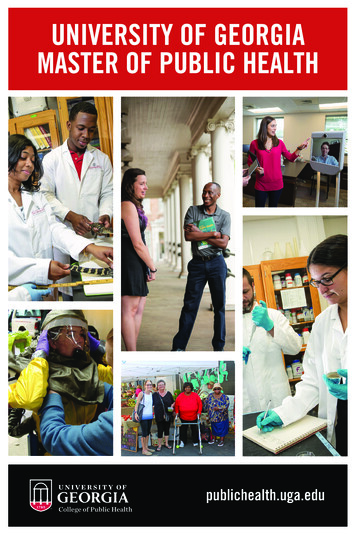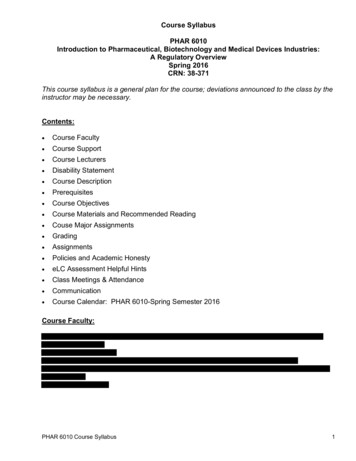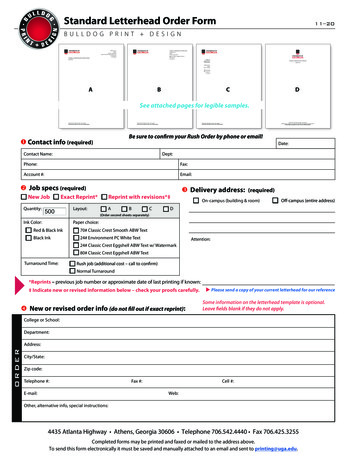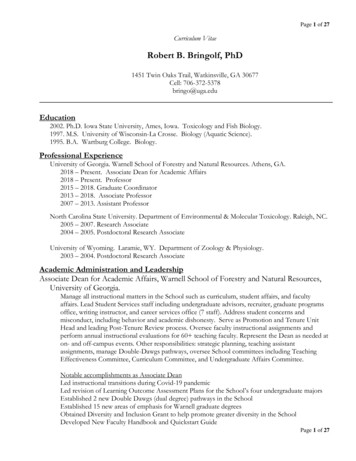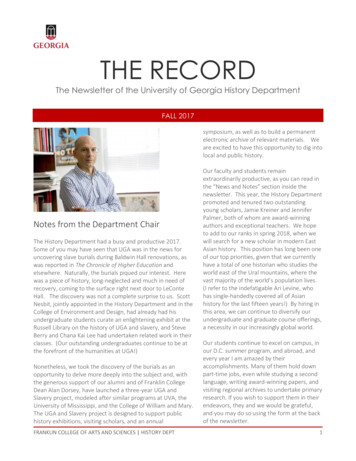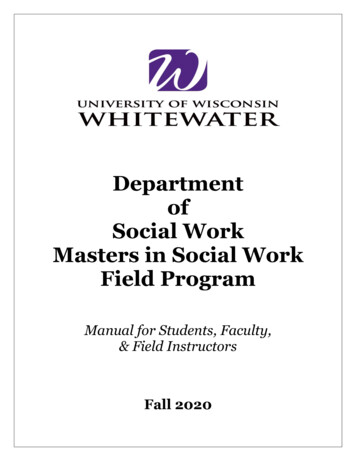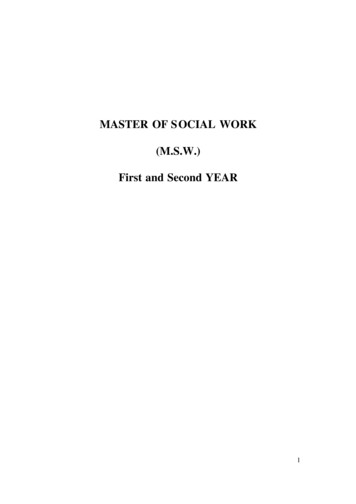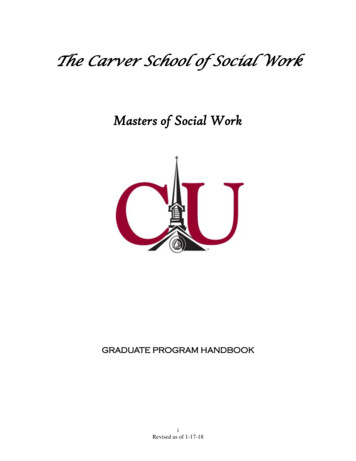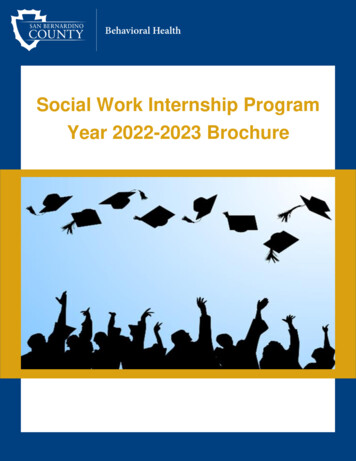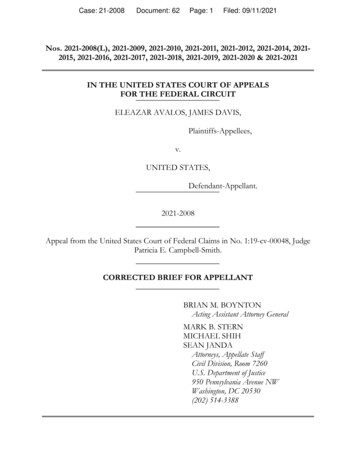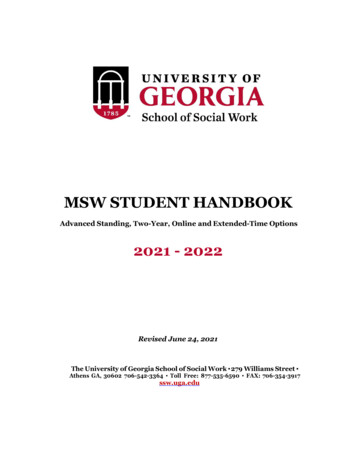
Transcription
MSW STUDENT HANDBOOKAdvanced Standing, Two-Year, Online and Extended-Time Options2021 - 2022Revised June 24, 2021The University of Georgia School of Social Work 279 Williams Street Athens GA, 30602 706-542-3364 Toll Free: 877-535-6590 FAX: 706-354-3917ssw.uga.edu
2021The University of Georgia School of Social WorkIn compliance with federal law, including the provisions of Title IX of the EducationAmendments of 1972, Title VI of the Civil Rights Act of 1964, Sections 503 and 504 ofthe Rehabilitation Act of 1973, the Americans with Disabilities Act of 1990, andExecutive Order 13672, the University of Georgia does not discriminate on the basis ofrace, sex, gender identity, sexual orientation, ethnicity or national origin, religion, age,genetic information, disability status or veteran status in its administration ofeducational policies, programs, or activities; its admissions policies; scholarship and loanprograms; athletic or other university-administered programs; or employment. Inquiriesor complaints should be directed to the Equal Opportunity Office, 119 Holmes-HunterAcademic Building, University of Georgia, Athens, GA 30602. Telephone 706-542- 7912(V/TDD). Fax 706-542-2822. Email ugaeoo@uga.edu.If you have a disability and need assistance to obtain this publication in an alternateformat, please contact Jenae Brown Bryan, (706) 542-5422,jenae.brown2019@uga.edu.ii
MSW PROGRAM CONTACTSDevon Sanger, MSW, LCSWCoordinator of MSW Field EducationSSW Building, Room 111706-542-5423, dsanger@uga.eduDean’s OfficeAnna M. Scheyett, M.S.W., Ph.D.Dean and ProfessorSSW Building, Room 145706-542-5424, amscheye@uga.eduVivian Burrell, MSW, LCSWCoordinator of Gwinnett MSW FieldEducation Gwinnett Campus, Room 215678-985-6792SSW Building, Room 113706-542-3949, vivian.burrell@uga.eduY. Joon Choi, Ph.D., MSW, MAInterim Associate Dean and AssociateProfessor Graduate CoordinatorSSW Building, Room 150706-542-2328, choiyj@uga.eduGraduate Assistantships, Out-of-StateTuitionWaiver RequestsMargeli MendezField Education OfficeSSW Building, Room 113706-542-5466, sswfield@uga.eduMSW Program OfficeContinuing EducationJennifer Elkins, M.S. S.W.,Ph.D.MSW Program DirectorSSW Building, Room 123706-542-2707, jelkins@uga.eduMSW Program OperationsJennifer AbbottDirector of Alumni Relations & SpecialProgramsSSW Building, Room 152706-542-9093, jabbott@uga.eduJenae Brown, M Ed, M.A.Academic Advisor/MSW Program SpecialistSSW Building, Room 117706-542-5422, jdb0326@uga.edu AcademicAdvising & Graduation Programs/Programof Study QuestionsUGA Gwinnett CampusConstance Wooden-Smith, MSW, LCSWGwinnett Campus CoordinatorAcademic AdvisorGwinnett Campus, Room 241678-985-6796, cw79225@uga.eduMSW AdmissionsMichael Robinson, PhD,MSSW, CAADCMSW Admissions CoordinatorSSW Building, Room 207706-542-5428, marobi01@uga.eduYosha P. Dotson, MSWGraduate Recruitment Coordinator andAcademic ProfessionalSSW Building, Room 217706-542-5450, y.dotson15@uga.eduField EducationZoe Johnson, PhD, LCSWDirector of Field EducationSSW Building, Room 109706-542-5419, zoe@uga.eduiii
TABLE OF CONTENTSPageWELCOME FROM THE DEAN AND PROGRAM DIRECTOR. 1CHAPTERIOVERVIEW. 2Code of Ethics . 2IIMSW PROGRAM MISSION, VALUES & GOALS. 3Program Mission. 3Program Vision . 3Program Values . 4Program Goals .5The Student Faculty Committee .5IIIMSW COMPETENCIES AND BEHAVIORS. 8CSWE Generalist-Level Competencies and Behaviors . 8MSW Specialization-Level Competencies and Behaviors . 10IVMSW CURRICULUM AND PROGRAMS OF STUDY . 17MSW Program Curriculum . 17Full-Time and Extended-Time Options . 18MSW Programs of Study. 19Electives Outside the School of Social Work . 26Independent Study .27Course Registration and Academic Advisement . 28Specialty Areas and Certificate Programs . 29Dual Degrees .33Global Engagement . 34VGRADUATION INFORMATION .35Requirements for Graduation.35Alumni Association .35VIACADEMIC POLICIES AND PROCEDURES. 36MSW Program Academic Policies . 36Academic Participation Policy . 36Academic Appeals . 36Acceptance of Credit by Transfer . 36Program Communication .37iv
Expectations for Professional Behavior .37Academic Professional Review Policy . 39Social Media . 39NASW Membership . 40Professional Liability Insurance . 41The UGA Graduate School . 42Course Withdrawal Policies . 42Incompletes, Academic Probation, and Dismissal . 43Course Overloads . 43Health Insurance . 44UGA Non-Discrimination and Anti-Harassment Policy . 44Academic Honesty Policy. 44APPENDICESA School of Social Work Grade Appeals and Academic and Professional PerformancePolicy . 46B Campus Resources . 49C Faculty Contact Information.53D Outside Elective Approval Form .55E Independent Study Approval Form .56FTake a course on another campus form .57G Incomplete Contract form 58-59v
279 Williams StreetAthens, Georgia 30602School of Social WorkDean’s OfficeTEL706-542-5424 FAX 706-354-3917ssw.uga.eduWELCOME TO THE SCHOOL AND PROGRAMDear Students,Welcome to the MSW program! We are so pleased and excited that you are joining the School ofSocial Work family. The school provides a rigorous academic experience combined withmultiple opportunities for community engagement, all with the goal of preparing you to promotewellbeing and social justice.While you are here, I hope you take advantage of all the school and the university have to offer.We have world-class faculty members engaged in instruction and in a wide range of importantresearch projects, who are always eager to talk about their work with you. The school also has anumber of outside-the-classroom events and experiences in which you can participate. These areas varied as guest speakers, teach-ins, film viewings and discussions, and internationalopportunities. Explore and experience as much as you can during your time here—it is a trulyrich environment.The School of Social Work is committed to your educational experience. We want to provideyou with the knowledge, skills, and competencies you will need to intervene effectively at theindividual, family, community, organizational, and policy levels. If you have thoughts orsuggestions about the program, please know that my door is always open.All of us at the school are looking forward to getting to know you as you matriculate through theMSW program. More importantly, we can’t wait to see what you do with your MSW as youmake positive changes in the world!Warmly,Anna M. Scheyett, MSW, PhDDean and ProfessorCommit to Georgia give.uga.eduAn Equal Opportunity, Affirmative Action, Veteran, Disability InstitutionJennifer Elkins, MSSW, PhDMSW Program Director andAssociate Professor
I. OVERVIEWThe UGA School of Social Work (SSW) has been preparing students for challengingand rewarding careers in social work for more than four decades. We opened ourdoors in 1964 with eight professors, 24 students, and one graduate degree program.Today, our School has over 30 faculty members and a student body numbering over600. It is accredited by the Council on Social Work Education to award the Master ofSocial Work (MSW) degree.The school has policies and procedures unique to its functioning within the Universityof Georgia (UGA). This handbook contains information, policies, and proceduresparticular to the MSW program. The Field Handbook provides additionalinformation pertaining to the requirements for our experiential field education. AllMaster of Social Work students should be familiar with both handbooks.The School of Social Work offers the following four degrees: Bachelor of Social Work(BSW), Master of Social Work (MSW), Master of Arts in Nonprofit Management andLeadership (MA MNL), and the Doctor of Philosophy (Ph.D.). Dual master degrees areoffered in public health (MSW/MPH), law (MSW/JD) and theology (MSW/M.Div.).The MSW/M.Div. dual degree is offered in collaboration with Emory University.A number of graduate certificates are also available to MSW students including the Marriageand Family Therapy Certificate, the Certificate in Nonprofit Management and Leadership,the Certificate in Gerontology and the Certificate in Substance Use Counseling.Code of EthicsThe National Association of Social Workers has codified a set of standards regardingprofessional responsibility to clients, to social work colleagues, to employingorganizations, to the social work profession, and to society. The Code of Ethics isavailable online: http://www.naswdc.org/pubs/code/default.asp.2
II. MSW PROGRAM MISSION, VALUES, & GOALS [AS 1.0]Program Mission[Accreditation Standard 1.0.1; 1.0.2]The Master of Social Work program prepares graduate students for advanced socialwork practice. We strive to develop future leaders in the profession of social workwho are able to meet the ever-changing challenges facing people of Georgia, thenation and the world.This mission is consistent with that of the University of Georgia, the state’s oldest, mostcomprehensive and most diversified institution of higher education. Its motto, “to teach,to serve, and to inquire into the nature of things,” reflects the University’s integral andunique role in the conservation and enhancement of the state’s and nation’s intellectual,cultural, and environmental heritage. In addition, the MSW program mission isconsistent with the school’s mission to provide local, state, national, and internationalleadership to promote social and economic justice, to alleviate oppressive socialconditions and problems, and to enhance human well-being.Similarly, the mission of the MSW program is interlinked with that of the BSWprogram, whose mission is to prepare students for entry-level social work practice; thePhD program, whose mission is to prepare social work professionals for careers inacademic research settings and for practice in program evaluation and other forms ofscientific research in the public and private sectors; and the MA NML program, whichprepares students for careers in the nonprofit sector.Program VisionWe envision a world where social workers are at the forefront of advocating on behalfof individuals, communities and service agencies in empowering the oppressed,promoting social justice, using the best science to resolve grand challenges, andcelebrating the many aspects of diversity.3
Program ValuesWe are committed to addressing power and oppression in society in order topromote social justice by using evidence informed practice and advocacytools and the celebration of diversity (PrOSEAD). In short, our values include acommitment to:Addressing Promoting Using Celebrating -Power and Oppression;Social justice;Evidence-informed practice and Advocacy,andDiversityPowerCertain sections of populations are more privileged than others in accessing resourcesdue to historical or contemporary factors related to class, race, gender, etc. Ourcurriculum will prepare students to: (i) identify and acknowledge privilege issues bothin society as well as at the practitioner/client level; (ii) use this understanding toinform their practice in order to competently serve clients who experiencedisenfranchisement and marginalization.OppressionSocial work practice across the micro-macro spectrum should work to negate theeffects of oppression or acts of oppression locally, nationally and globally. Ourcurriculum will prepare students to more effectively empower oppressed groups andprevent further oppression among various populations within the contexts of social,cultural, economic, political, and environmental frameworks.Social JusticeSocial workers understand that human rights and social justice, as well as socialwelfare and services, are mediated by policy and its implementation at the federal,state, and local levels. Our curriculum will prepare students to engage in policypractice at the local, state, federal, or international levels in order to impact social4
justice, well-being, service delivery, and access to social services of our clients,communities and organizations.Evidence Informed PracticeSocial workers understand that the clients’ clinical state is affected not only byindividual-level factors but also by social, economic, and political factors. We are alsocognizant that research shows varied levels of evidence for practice approaches withvarious clients or populations. Our curriculum will prepare students to engage inevidence-informed practice. This includes finding and employing the best availableevidence to select practice interventions for every client or group of clients, while alsoincorporating client preferences and actions, clinical state, and circumstances.AdvocacyEvery person regardless of position in society has fundamental human rights tofreedom, safety, privacy, an adequate standard of living, health care and education.Our curriculum will prepare students to apply their understanding of social,economic, and environmental justice and their knowledge of effective advocacy andsystems change skills to advocate for human rights at the individual and system levels.DiversitySocial workers need to understand how diversity and difference characterize and shapethe human experience and are critical to the formation of identity. Our curriculum willproduce students who are able to engage, embrace, and cherish diversity and differenceacross all levels of practice.Program Goals[Accreditation Standard 1.0.3]Graduates of the UGA School of Social Work will demonstrate knowledge, skills, andleadership in the following five program outcomes that are derived from our mission.Associated with each of these outcomes are the competencies specified by ouraccrediting body, the Council on Social Work Education (CSWE).1. Engage in advanced social work practice with individuals, families,groups, organizations, and communities to enable inclusion in thecontext of cultural diversity and persons in the immediate and globalenvironments; [EPAS Competencies 2, 6, & 7]2. Uphold the principles, values, and ethics of the social work professionthrough reflection, awareness, and with consideration of the broader contextsof the world in which we live; [EPAS Competencies 1, 2, & 3]3. Utilize knowledge and theories of biological, psychological, social, spiritual, andcultural dimensions of human development to inform practice; [EPASCompetencies 1, 2, 4, & 8]5
4. Engage as critical consumers and producers of research and evaluationapplied to practice at the clinical, community, policy, and administrativelevels; [EPAS Competencies 4, 8, & 9]5. Influence social policies consistent with the goals of the profession to addresspoverty and advocate for vulnerable, oppressed populations, and challengepower imbalances that affect resource distribution; [EPAS Competencies 3 &6]6
The Student Faculty CommitteeThe School of Social Work Student Faculty Committee (SFC) represents students’interests and needs at the MSW program. Students elect their own SFC representativeseach fall and the SFC elects its own leaders. The SFC meets about twice a month andthe meetings are open to all MSW students, faculty and staff at the School of SocialWork. Any individual wanting to speak to the group is welcome to do so.The MSW director and two SSW faculty are members of the SFC and serve as mentorsand key contacts to the SFC. Faculty members generally serve on the committee for atleast one calendar year, beginning at the start of the fall semester and ending in thespring semester of that same school year. A faculty member may serve on thecommittee for consecutive terms; this will be encouraged when it results in staggeredterms among faculty members for the sake of creating overlap and continuity.Term limits do not apply to ex officio faculty members. One member of the SFC ispart of the MSW faculty committee where he/she represents MSW student issues tothe MSW Faculty Committee.The goal of the SFC is to foster understanding and open communication between AthensMSW students, faculty and administration, as well as to advance the reputation andfacilitate the expansion of the MSW program.The SFC has had a voice in key issues at the SSW since it was established in 1969. Mostrecently, these include the 2016 dean search, the 2017 revision and reorganization ofthe MSW curriculum, and advocating for better facilities. The SFC is critical to theschool’s mission and vision.Please note: The MSW Gwinnett and the MSW Online Programs SFC are comprised oftwo-students per cohort year and will meet once a month if needed, but at least twice asemester. It is expected that the SFC representatives from each program option meetat least once per semester.7
III. MSW COMPETENCIES AND BEHAVIORSOur PrOSEAD values as well as our school’s vision and mission statements shape thecurriculum. A set of five program outcomes are aimed at preparing students to becomeactivist practitioners engaged in micro, macro and/or integrated practice. The CSWEcompetencies offer a foundation on which we have built our curriculum. Implicit in ourmission statement is our view of social work education as committed to viewingstudents as future leaders and as informed and collaborative members of broaderlearning communities charged with addressing power and oppression; promoting socialjustice; using the relevant evidence to inform practice at all levels, while celebrating thevast diversity in our local, national and global communities.The courses that address the major curriculum content areas are organized to promotehorizontal and vertical integration through a logical flow within and between thegeneralist and advanced content. By reviewing course learning objectives and syllabi, itis possible to see the logic of course content sequencing. Students are encouraged tobring their relevant professional and life experiences into the classroom to enrich thelearning environment.Specifically, the courses meet the nine CSWE core competencies and generalistbehaviors as well as our specialized behaviors. Each competency describes theknowledge, values, skills, and cognitive and affective processes that comprise thecompetency, followed by a set of behaviors that integrate these components. Thebehaviors represent observable components of the competencies, similar to the mannerin which manifest items represent underlying latent constructs.Students are also expected to be familiar with the academic requirements andinformation presented on the SSW website, this handbook, the Field Manual, and tofollow School of Social Work and Graduate School’s guidelines and requirements.Failure to do this could delay graduation.Council on Social Work Education (CSWE) Generalist-Level Competenciesand BehaviorsI.Demonstrate Ethical and Professional Behavior1.Make ethical decisions by applying the standards of the NASW Code ofEthics, relevant laws and regulations, models for ethical decisionmaking, ethical conduct of research, and additional codes of ethics asappropriate to context; Use reflection and self-regulation to managepersonal values and maintain professionalism in practice situations;2.Demonstrate professional demeanor in behavior; appearance; and oral,written, and electronic communication;3.Use technology ethically and appropriately to facilitate practice outcomes;8
4.Use supervision and consultation to guide professional judgment andbehavior.II.Engage Diversity and Difference in Practice1.Apply and communicate understanding of the importance of diversity anddifference in shaping life experiences in practice at the micro, mezzo, andmacro levels;2.Present themselves as learners and engage clients and constituencies asexperts of their own experiences;3.Apply self-awareness and self-regulation to manage the influence ofpersonal biases and values in working with diverse clients andconstituencies.III.Advance Human Rights and Social, Economic, and EnvironmentalJustice1.Apply their understanding of social, economic, and environmentaljustice to advocate for human rights at the individual and systemlevels;2.Engage in practices that advance social, economic, and environmental justice.IV.Engage in Practice-informed Research and Research-Informed Practice1.Use practice experience and theory to inform scientific inquiry and research;2.Apply critical thinking to engage in analysis of quantitative andqualitative research methods and research findings;3.Use and translate research evidence to inform and improve practice,policy, and service delivery.V.Engage in Policy Practice1.Identify social policy at the local, state, and federal level that impacts wellbeing, service delivery, and access to social services;2.Assess how social welfare and economic policies impact the deliveryof and access to social services;3.Apply critical thinking to analyze, formulate, and advocate forpolicies that advance human rights and social, economic, andenvironmental justice.VI.Engage with Individuals, Families, Groups, Organizations, andCommunities1.Apply knowledge of human behavior and the social environment, personin- environment, and other multidisciplinary theoretical frameworks toengage with clients and constituencies;2.Use empathy, reflection, and interpersonal skills to effectively engagediverse clients and constituencies.VII.Assess Individuals, Families, Groups, Organizations, and Communities1.Collect and organize data, and apply critical thinking to interpretinformation from clients and constituencies;2.Apply knowledge of human behavior and the social environment,9
3.4.person-in- environment, and other multidisciplinary theoreticalframeworks in the analysis of assessment data from clients andconstituencies;Develop mutually agreed-on intervention goals and objectives basedon the critical assessment of strengths, needs, and challenges withinclients and constituencies;Select appropriate intervention strategies based on the assessment,research knowledge, and values and preferences of clients andconstituencies.VIII. Intervene with Individuals, Families, Groups, Organizations, andCommunities1.Critically choose and implement interventions to achieve practicegoals and enhance capacities of clients and constituencies;2.Apply knowledge of human behavior and the social environment,person-in- environment, and other multidisciplinary theoreticalframeworks in interventions with clients and constituencies;3.Use inter-professional collaboration as appropriate to achieve beneficialpractice outcomes;4.Negotiate, mediate, and advocate with and on behalf of diverseclients and constituencies;5.Facilitate effective transitions and endings that advance mutuallyagreed-on goals.IX.Evaluate Practice with Individuals, Families, Groups, Organizations, andCommunities1.Select and use appropriate methods for evaluation of outcomes;2.Apply knowledge of human behavior and the social environment,person-in- environment, and other multidisciplinary theoreticalframeworks in the evaluation of outcomes;3.Critically analyze, monitor, and evaluate intervention and programprocesses and outcomes;4.Apply evaluation findings to improve practice effectiveness at the micro,mezzo, and macro levels.MSW Specialized-Level Competencies and BehaviorsI.Demonstrate Ethical and Professional BehaviorMicro track behaviors:1.Demonstrate professional boundaries, roles, and demeanor in advancedsocial work practice and relationships with diverse clients andprofessionals;2.Apply the NASW Code of Ethics, relevant laws and regulations, ethicaldecision- making principles and frameworks to issues specific to microsocial work practice;3.Use reflection, self-regulation, and clinical supervision to managepersonal values and maintain professionalism in practice situations.10
Macro track behaviors:1.Demonstrate professional boundaries, roles, and demeanor in macropractice settings and relationships with diverse constituencies;2.Apply the NASW Code of Ethics, relevant laws and regulations, ethicaldecision- making principles and frameworks to issues in organizational,community, and/or policy practice;3.Identify opportunities for social work involvement to engagediverse constituencies in advocating for social justice.Combined track behaviors:1.Demonstrate professional boundaries, roles, and demeanor in advancedsocial work practice and relationships with diverse clients,professionals, and constituencies;2.Apply the NASW Code of Ethics, relevant laws and regulations, ethicaldecision- making principles and frameworks to issues specific to microand macro social work practice;3.Use reflection, self-regulation, and clinical supervision to managepersonal values and maintain professionalism in practice situations;4.Identify opportunities for social work involvement to engagediverse constituencies in advocating for social justice.II.Engage Diversity and Difference in PracticeMicro track behaviors:1.Demonstrate awareness of historical and contemporary forms ofprivilege, power, oppression, discrimination, and/or marginalizationand their impact on clients;2.Engage clients as experts of their own experiences;3.Apply self-awareness and self-regulation to manage personal biases andvalues in working with clients to avoid contributing to stereotypes,shaming, and stigmatization.Macro track behaviors:1.Demonstrate awareness of historical and contemporary forms ofprivilege, power, oppression, discrimination, and/or marginalizationand their impact on constituencies;2.Engage constituencies as experts of their own experiences;3.Apply self-awareness and self-regulation to manage personal biases andvalues in working with constituencies to avoid contributing tostereotypes, shaming, and stigmatization.Combined track behaviors:1.Demonstrate awareness of historical and contemporary forms ofprivilege, power, oppression, discrimination, and/or marginalizationand their impact on clients and constituencies;2.Engage clients and constituencies as experts of their own experiences;3.Apply self-awareness and self-regulation to manage personal biases and valuesin working with clients and constituencies to avoid contributing to stereotypes,11
III.shaming, an
Academic Advisor/MSW Program Specialist SSW Building, Room 117 706-542-5422, jdb0326@uga.edu Academic Advising & Graduation Programs/Program of Study Questions MSW Admissions Michael Robinson, PhD, MSSW, CAADC MSW Admissions Coordinator SSW Building, Room 207 706-542-5428, marobi01@uga.edu Yosha P. Dotson, MSW
